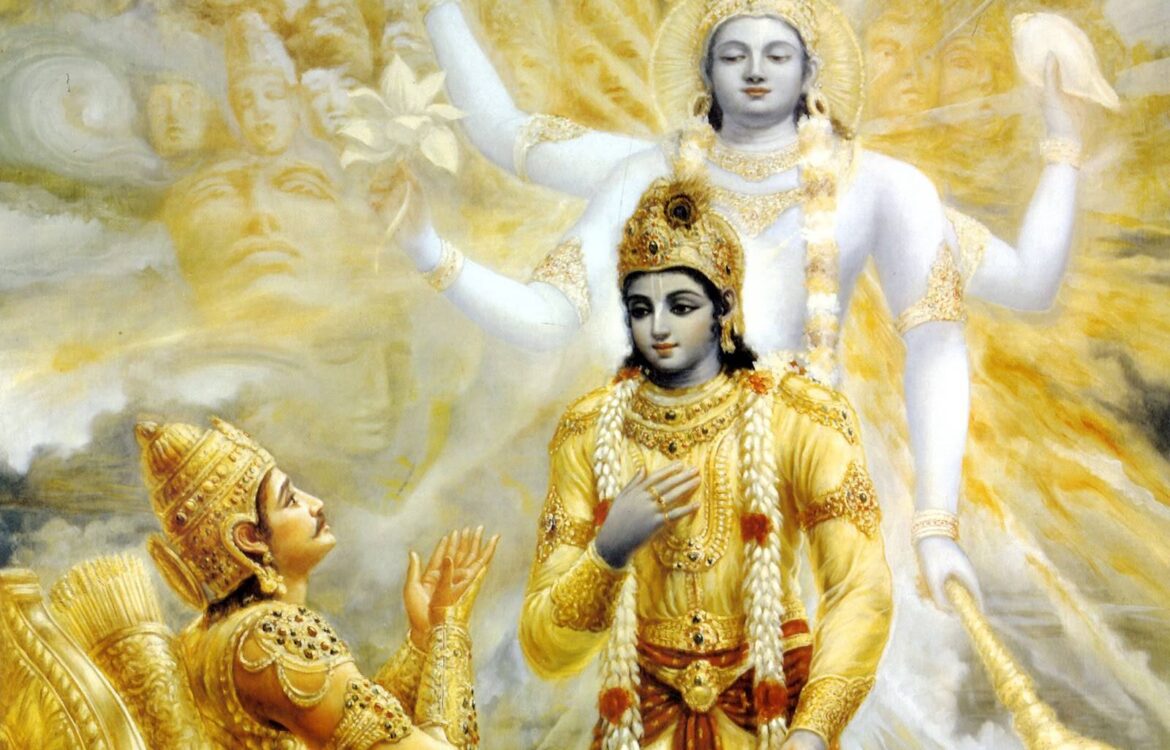Introduction : Arjuna’s despondency
The Ramayana and The Mahabharata are our National epics. The Mahabharata is written by Muni Vyas.The Bhagavad Gita is part of Mahabharat.The Gita has been set in the Mahabharata. Standing in the middle of the great epic like a lighthouse, it illuminates the whole of the epic.
Muni Vyas has given cream of the entire Mahabharata in the Gita.
The Mahabharata vividly brings out the fact that none but God is completely faultless and good, and also that none can be said to be evil personified. For instance, it points out faults even of moral giants like Bhishma and Dharmaraj, and virtues in the characters like Karna and Duryodhana.
There are many who feel that the Gita should be taken to begin with the Second Chapter. The actual teaching starts from the eleventh verse of the Second Chapter.
Nonetheless, the preceding introductory portion has a value of its own. Without it we would not have properly understood Arjuna’s standpoint and the genesis of the Gita.
Muni Vyasa has presented the Gita in the form of dialogue between Krishna and Arjuna.Because of this, it is easier for readers to understand the Gita.
Many contend that Arjuna was going weak at the knees and the Gita was preached to restore his manliness and induce him to fight.But a little thinking will show the error in this view. It was not out of fear that Arjuna was shying away from the battle. The great warrior had fought hundreds of battles. He had single-handedly routed Bhishma, Drona and Karna when they had invaded Virat’s kingdom. Then why would he run away from the war?So removal of Arjuna’s fear was certainly not the purpose of the Gita.
It is also said that the Gita is meant to make Arjuna willing to fight by removing his inclination towards nonviolence. However, this view also is not right because he was firmly standing on the battlefield after all the ways of settlement with Kauravas had failed.
His words were seemingly wise, but not really so.
Seeing his kinsmen on the battlefield, Arjuna lost his nerve and deep anguish assailed his heart.The attachment to his kith and kin prevailed over him. When a man with a sense of duty is caught in delusion, he cannot face his naked lapse from duty. He tries to justify it by citing lofty principles. The same thing happened with Arjuna. He now started putting before Krishna, to convince him, the specious argument that war in itself was sinful, that it would destroy the clan, eclipse dharma and lead to moral anarchy, scarcity and devastation, and bring many other disasters upon the society.
After this Srkrishna answered all the doubts of Arjuna.Once Arjuna overcame the feeling of attachment and his delusion was removed,he got ready for the war.We are going to discuss these questions and answers in the upcoming chapters.
For Arjuna war was a natural and inescapable duty. But he was trying to evade it under the spell of delusion. It is this delusion that the Gita attacks most pointedly.
Dispelling anti-swadharma delusion and working without expecting fruits is the main teaching from the Gita.
The word dharma here does not mean a religion like Hinduism, Islam or Christianity. Every individual, in fact, has his own distinct dharma. Swadharma of every individual also changes with time.As one’s mind grows and develops through reflection and experience, the old dharma gets shed and one acquires new dharma.
Arjuna was an extreme devotee of Krishna.He followed Krishna’s instructions.He was benefited with the Victory. Let us follow Krishna too.That Partha Sarathi will drive our life chariots also.He will lead us to the Victory over delusion.

